Capoeira, a Brazilian form of martial arts that combines elements of dance, music, self-defense, and acrobatics, has gained huge popularity in a surprising place. All across Syria, children have discovered capoeira through an organisation called Bidna Capoeira (We Want Capoeira in English). The international organisation was founded by Tarek Alsaleh, who began by teaching capoeira to children in the streets of Damascus. His classes were so popular that he formed a team of capoeiristas to teach classes, expanding from the street to hospitals and refugee camps.
Capoeira, a Brazilian form of martial arts that combines elements of dance, music, self-defense, and acrobatics, has gained huge popularity in a surprising place. All across Syria, children have discovered capoeira through an organisation called Bidna Capoeira (We Want Capoeira in English). The international organisation was founded by Tarek Alsaleh, who began by teaching capoeira to children in the streets of Damascus in 2007. His classes were so popular that he formed a team of capoeiristas to teach classes, expanding from the street to hospitals and refugee camps. Bidna Capoeira was formed in 2010 after capoeira practice began in Al-Tanf refugee camp, a desolate place in the desert between Syria and Iraq.
The opportunity to play, to make music, and to socialise is rare for many children in refugee camps, and this is where Bidna Capoeira has seen much of their success. Refugee communities are particularly wary of capoeira, Alsaleh found, but members of the community quickly recognise the positive social consequences of capoeira, and encourage their children to attend classes. Alsaleh also trains members of the community to become capoeira instructors, implanting the discipline into the fabric of these societies.
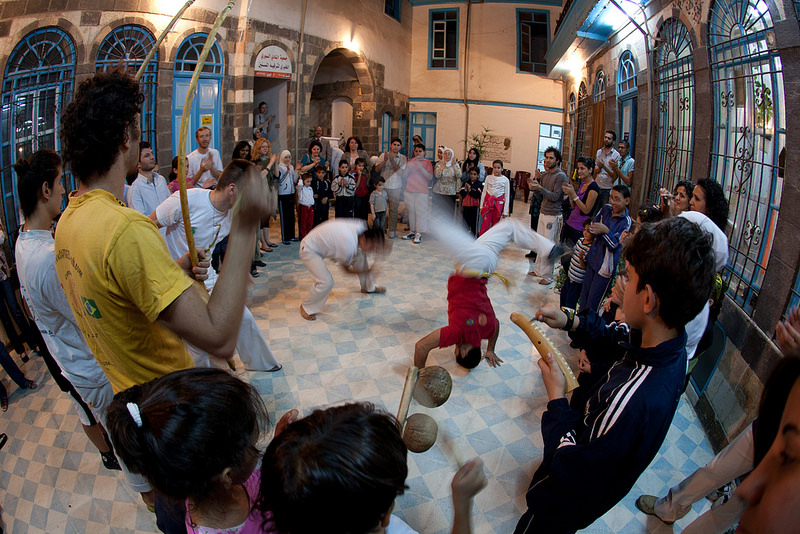
The fundamental element of capoeira, the roda, provides a safe space. Children who have quite often been exposed to atrocities beyond comprehension have not been able to process their experiences, and the stress manifests itself in their behaviour. The positive effects of capoeira are visible in the transformation of children.
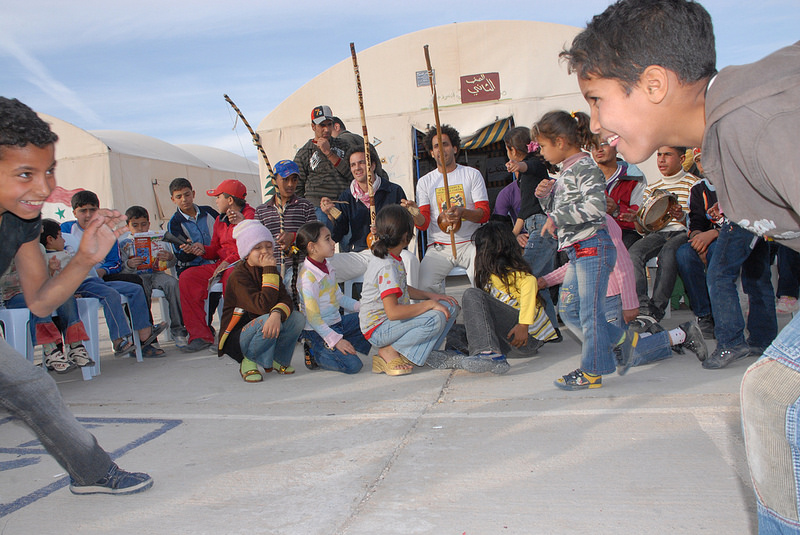
Al-Tanf Refugee Camp, Syria-Iraq border
Ahmed was ten years old, living with his mother and sister. He was very attached to his father, who passed away a while ago. He became very aggressive, and even his mother couldn’t control him. Ahmed started coming to capoeira practice and the trainers noticed that he was a quick learner. He had good singing and practicing skills, but he needed special attention.
One day, Ahmed was exceptionally quiet, and had tears in his eyes. The trainers were worried. After practice, he told them that he felt his actions do not satisfy anyone and that he feels detestable. They told him that everyone loves him but that his behaviour makes people mad at him. This conversation had a good effect on him, even his mother felt the change in her son and she was happy about that. In the roda he stopped interrupting or talking over people. He became attentive and followed the rules of the game. His mother said that he started to see how his behaviour had an effect on the relationships with other people.
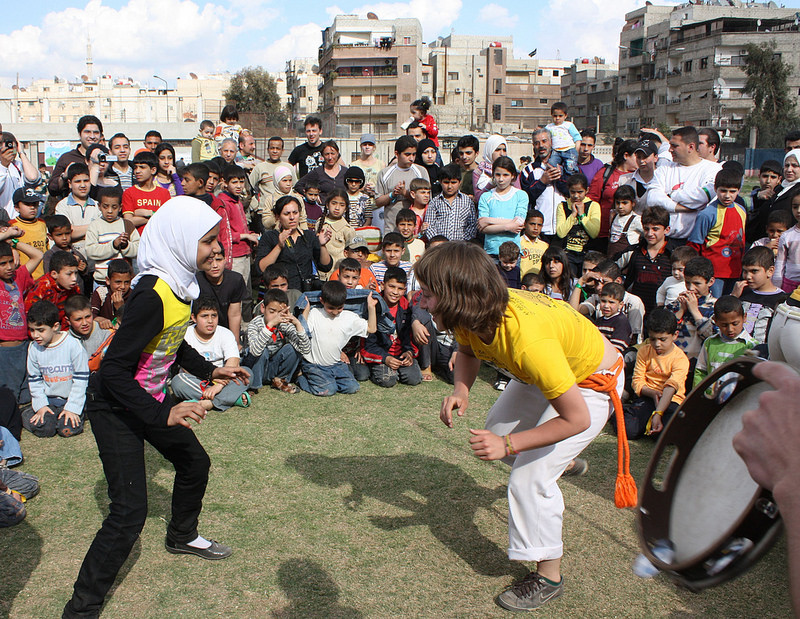
Yarmouk Refugee Camp, Damascus
Capoeira is also a haven for children whose family life is extremely stressful. Nisreen was 12 years old when her father remarried four years ago and brought his new wife to live with his family. This caused great family tension, because Nisreen’s family only just managed with help from her maternal grandparents. As a result, Nisreen’s father spent most of his time outside the house. He was irresponsible and selfish, not looking after his children, caring only for money and himself. His carelessness affected Nisreen terribly.
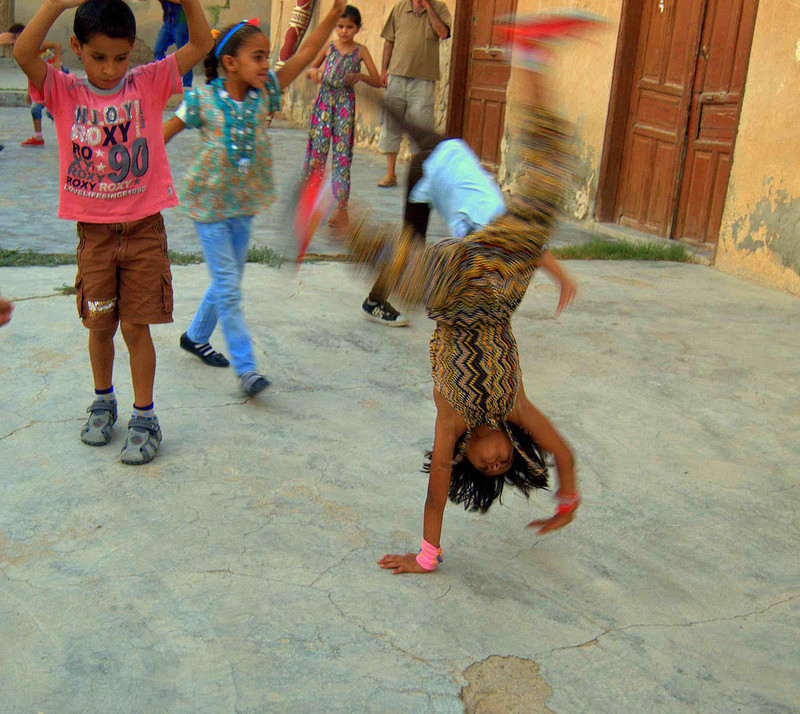
Nisreen was very distracted when she first started going to capoeira practice. The club was near her home and she decided to join it as a way of getting out of the house. She wanted to forget that, unlike her girlfriends, she had no proper father, and he brought her no presents.
She came to capoeira practice everyday. Even when the club moved away from her home, she moved in with her aunt who lived near the facility. The trainers noticed that she was very skillful both in singing and playing. She worked hard to win a lot of games and trophies and prizes. It was her way of making up for her family life, and she became confident again. She began to visit her father and show him the prizes that she won. She would tell him about the moves she’d learned and eventually, they became close and he started to treat her well.
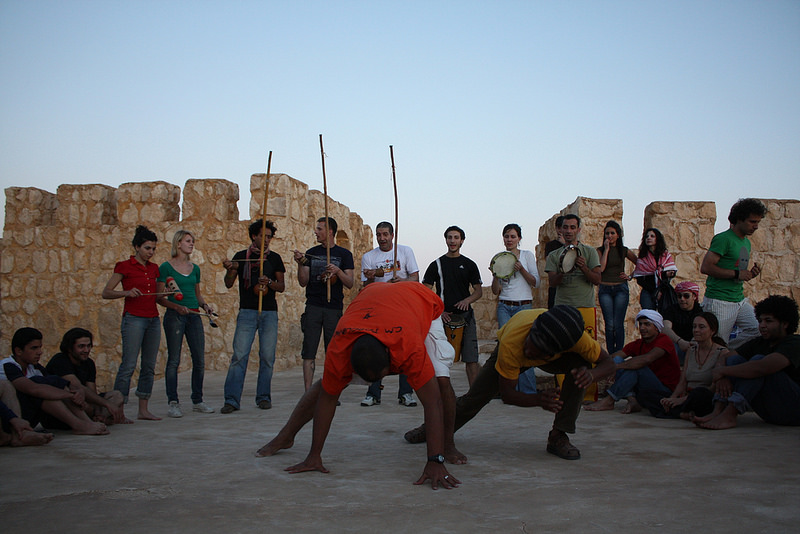
The story of Mahmoud, an 8-year-old boy, is another example of how capoeira provides alternatives for Syria’s children. Mahmoud was from an average income family, but his father was paralysed. When Mahmoud felt his father’s disability controlling his life, he joined extremist groups. It seemed like the most logical form of escape. He liked the groups and their members because he felt like he had responsibilities and he liked their ideology.
All it took was someone offering him an alternative to fighting for him to leave the extremists. A trainer saw him on the street and took him to a capoeira practice. He watched the kids playing and having fun. He spoke to people who told him he is young and should let himself be a child. He started practicing intensively, and quickly forgot his time with the extremists. After a while he became an ordinary kid like any other.
Bidna Capoeira operates throughout Syria, Palestine, and Jordan. The vibrancy they foster in communities that have lived through indescribable violence and hardship is offering children across war-torn nations an alternative to a lifetime of pain and anger.
All photos and stories courtesy of Bidna Capoeira